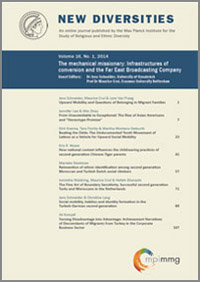Authorizing Religious Conversion in Administrative Courts: Law, Rights, and Secular Indeterminacy
by Mona Oraby (Northwestern University)
To cite this article: Oraby, M. (2015). Authorizing Religious Conversion in Administrative Courts: Law, Rights, and Secular Indeterminacy. New Diversities, 17(1), 63–75. https://doi.org/10.58002/g2b2-2430
The administration of religious difference in modern Egypt suggests more continuity in the state’s involvement in personal status affairs over the course of the twentieth and twenty-first centuries than is generally thought to exist. At the same time, the role that the administrative courts have played, on the one hand, in regulating formal religious identity and, on the other hand, in adjudicating conversion and apostasy has gone largely unaddressed. This article argues that constituting religious identity as an administrative category subject to judicial oversight was part of a larger constellation of political arrangements that reorganized relations among legal and bureaucratic institutions, religious authority, and state capacity in the modern period. By accounting for the enduring inconsistency with which the rule of law is deployed in religious status jurisprudence and the French legal influences that undergird this practice, the article illuminates how the administrative judiciary, a purportedly secular institution meant to curb an unwieldy bureaucracy, sustains rather than restricts sovereign state decisionism. The paradoxes of judicial discretion construct mutable boundaries between minority and majority religious populations that are central to the exercise of secular power.
Keywords: Egypt, secularism, Majlis al-Dawla, conversion, minorities, public order
|
